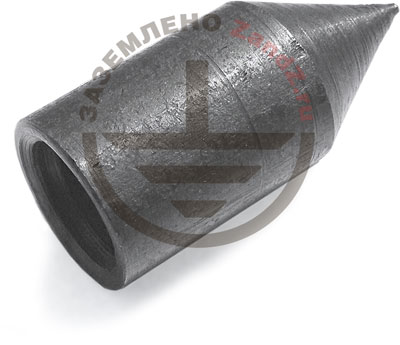There are two types of grounding: artificial and natural. The role of natural grounding is played by the metal structures of the object, which are constantly in the ground: foundation fittings, plumbing, casings, etc. Artificial grounding is a separate independent design, which is mounted into the ground. Almost every contractor faces the question during the installation of grounding, what grounding is better: artificial or natural?
To answer this question let's study the regulatory documents, namely to paragraphs 1.7.54 and 1.7.109 of the "Electrical Installation Code" (EIC). We see the answers here: both natural and artificial ground electrodes will be fine for grounding Let's find out in which cases it is more correct to apply a particular method? Let's examine each option in more detail.

If you decide to use a natural ground electrode, then you need to be aware of many factors: type of the foundation of the object, its material, as well as ground aggressivity. The EIC 1.7.109 sets out options of object construction, which can be used as ground electrodes. Foundation is the most common of them. There are several types of foundations: tape, columnar, pile and slab. The choice of the foundation depends on soil density, seismic activity, topography, groundwater level and depth of soil freezing. Fittings, concrete, brick, wood, rough stones, asbestos-cement or metal pipes are used as material. You can find more information about the foundation in theregulatory documentation (CSRB 5.01.01-99 Footings and foundations of buildings and structures). Thus, deciding to use your foundation as a ground electrode, it is necessary to make sure that it has electrically connected metal parts.
All elements of the ground electrode should be united into one contour and contact with the ground for draining currents, directly or through the concrete. Also selected earthing should meet the requirements of SAE on the magnitude of the conductor cross-sectional area (Table 1.7.4). In the process of using the natural ground electrode, one should not allow the destruction of its structure or malfunctions of the devices associated with it.
It is not allowed to use sewage pipes and central heating pipes as ground electrodes, as well as piping for flammable and explosive mixtures. The pipes are easily subjected to metal corrosion, thus breaking the electrical contact. This type of grounding is definitely more economical: it does not require expenditures for materials, installation and dismantling of the grounding device, but in the course of its long-term operation, repair of the damaged parts will cost less than installation of a separate grounding.
Natural ground electrode
Option 2. Artificial ground electrode
It represents itself a set of electrodes installed in the ground and connected to the electrical equipment with the help of the grounding conductor. Copper steel, galvanized steel, or ferrous metals are used as electrode materials:
- Copper steel has the highest electrical conductivity and adhesion with various materials. The connection of copper with steel is stronger than with zinc, that is why, copper-bonded rods are stronger than galvanized. Copper is less electrochemically active than zinc and steel, which increases the service life of up to 100 years.
- Galvanized steel is a corrosion-resistant material with low resistivity. The electrodes of this metal have a high resistance to acid environments with an average lifetime of 30 years.
- Ferrous metals have a high mechanical strength, but are quickly destroyed when used in an aggressive soil environment, forming rust and corrosion. As a consequence, we obtain high resistance to current spreading, which represents danger to human life.
Dimensions of conductors must comply with the GOST R 50571.5.54-2013. Many variants of installation of a grounding device help to provide the desired surface contact area of the ground electrode with the ground, which in its turn allows influencing the value of current spreading resistance. The advantage of an artificial ground electrode is that it can be installed deep in the ground where the resistivity is lower due to the groundwater that flows down. This ensures stability of the final resistance.

Artificial ground electrode
To summarize: it is possible to use any option described above, the main thing is to approach this issue with due responsibility. For the safety of your home and an extended service life, choose grounding with an anti-corrosion coating, manufactured in accordance with the regulatory rules. Call or write to our Technical Center and we will pick the necessary grounding kit for your object.
Related Articles:












